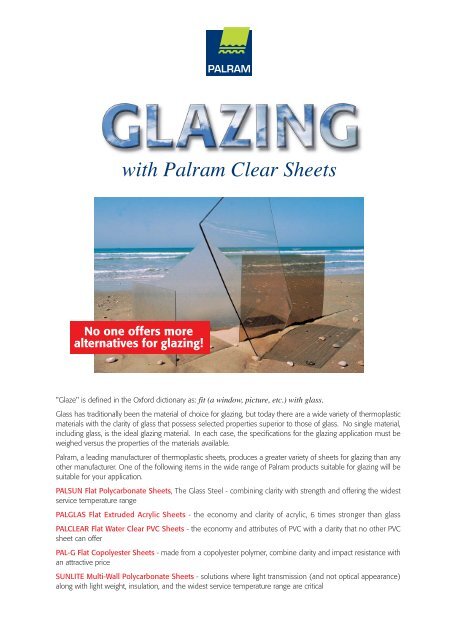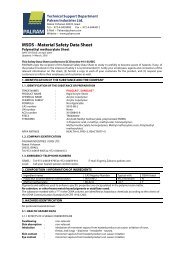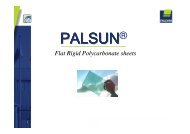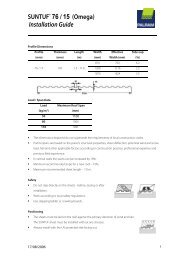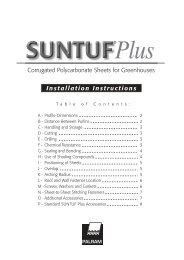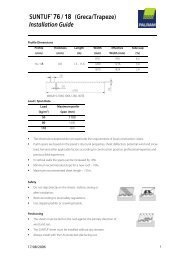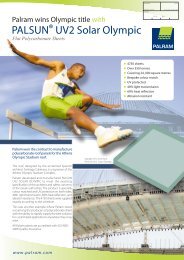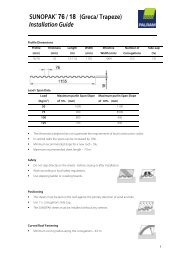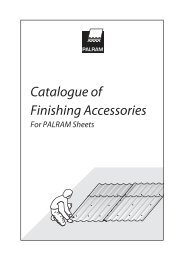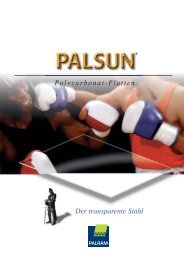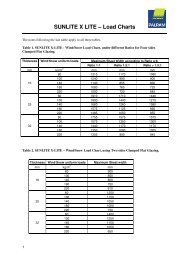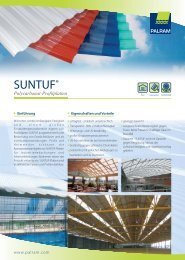with Palram Clear Sheets
with Palram Clear Sheets
with Palram Clear Sheets
Create successful ePaper yourself
Turn your PDF publications into a flip-book with our unique Google optimized e-Paper software.
<strong>with</strong> <strong>Palram</strong> <strong>Clear</strong> <strong>Sheets</strong><br />
No one offers more<br />
alternatives for glazing!<br />
"Glaze" is defined in the Oxford dictionary as: fit (a window, picture, etc.) <strong>with</strong> glass.<br />
Glass has traditionally been the material of choice for glazing, but today there are a wide variety of thermoplastic<br />
materials <strong>with</strong> the clarity of glass that possess selected properties superior to those of glass. No single material,<br />
including glass, is the ideal glazing material. In each case, the specifications for the glazing application must be<br />
weighed versus the properties of the materials available.<br />
<strong>Palram</strong>, a leading manufacturer of thermoplastic sheets, produces a greater variety of sheets for glazing than any<br />
other manufacturer. One of the following items in the wide range of <strong>Palram</strong> products suitable for glazing will be<br />
suitable for your application.<br />
PALSUN Flat Polycarbonate <strong>Sheets</strong>, The Glass Steel - combining clarity <strong>with</strong> strength and offering the widest<br />
service temperature range<br />
PALGLAS Flat Extruded Acrylic <strong>Sheets</strong> - the economy and clarity of acrylic, 6 times stronger than glass<br />
PALCLEAR Flat Water <strong>Clear</strong> PVC <strong>Sheets</strong> - the economy and attributes of PVC <strong>with</strong> a clarity that no other PVC<br />
sheet can offer<br />
PAL-G Flat Copolyester <strong>Sheets</strong> - made from a copolyester polymer, combine clarity and impact resistance <strong>with</strong><br />
an attractive price<br />
SUNLITE Multi-Wall Polycarbonate <strong>Sheets</strong> - solutions where light transmission (and not optical appearance)<br />
along <strong>with</strong> light weight, insulation, and the widest service temperature range are critical
QUALITATIVE Comparison of <strong>Palram</strong> <strong>Clear</strong> <strong>Sheets</strong> for Glazing <strong>with</strong> Glass<br />
Sheet<br />
PALSUN<br />
SUNLITE<br />
PAL-G<br />
PALGLAS<br />
PALCLEAR<br />
Glass<br />
Description<br />
Impact Strength<br />
Flat polycarbonate<br />
sheet<br />
Excellent<br />
Multi-Wall<br />
polycarbonate<br />
sheet<br />
Good<br />
Flat PETG<br />
sheet<br />
Excellent<br />
Flat acrylic (PMMA)<br />
sheet<br />
Poor<br />
Flat PVC sheet<br />
Good<br />
Glass Sheet<br />
Extremely Poor<br />
Weight<br />
Light<br />
Lightest<br />
Light<br />
Light<br />
Light<br />
Heavy<br />
Light Transmission<br />
Transparency/Clarity<br />
Thermal Insulation<br />
Excellent<br />
Excellent<br />
Good<br />
Good (<strong>with</strong><br />
distortion)<br />
Fair (rib<br />
interference)<br />
Excellent<br />
Excellent<br />
Excellent<br />
Good<br />
Excellent<br />
Excellent<br />
Good<br />
Excellent<br />
Excellent<br />
Good<br />
Excellent<br />
Excellent<br />
Poor<br />
UV Resistance<br />
Excellent <strong>with</strong> UV<br />
protective layer<br />
Excellent <strong>with</strong> UV<br />
protective layer<br />
Very good <strong>with</strong> UV<br />
protective layer<br />
Inherently excellent<br />
Excellent <strong>with</strong> UV<br />
protective layer<br />
UV radiation has no<br />
effect on glass.<br />
Fire Resistance<br />
Good (Excellent in<br />
FR grade)<br />
Good<br />
Fair<br />
Poor<br />
Excellent<br />
Excellent, but tends<br />
to shatter<br />
Abrasion Resistance<br />
Fair<br />
Fair<br />
Fair<br />
Good<br />
Fair<br />
Excellent<br />
Chemical Resistance<br />
Fair<br />
Fair<br />
Good<br />
Fair<br />
Excellent<br />
Excellent<br />
Thermoformability<br />
Fair<br />
Not relevant<br />
Excellent<br />
Good<br />
Excellent<br />
Bendable. Shaped<br />
by different<br />
technology.<br />
Machining<br />
Excellent<br />
Excellent<br />
Excellent<br />
Good<br />
Excellent<br />
Poor
Impact Strength<br />
Glass is the most fragile of materials. With the exception of<br />
PALGLAS, all <strong>Palram</strong> sheets have a vastly superior resistance to<br />
impact when compared <strong>with</strong> regular glass (Note that PALGLAS<br />
acrylic is still 6 times stronger than glass and when it does<br />
shatter, larger less dangerous pieces result). The best,<br />
solution is PALSUN polycarbonate. For a given mm<br />
thickness, there is no clear material that is stronger.<br />
Hail will not penetrate skylights made from PALSUN.<br />
PAL-G copolyester is intermediate in strength, while<br />
the impact resistance of PALCLEAR is somewhat<br />
less. SUNLITE stands up well against large objects<br />
where the ribbing absorbs the brunt of the<br />
impact. However, an impact resistance of<br />
1 mm polycarbonate will characterize impact<br />
by smaller objects between the ribs, which<br />
is far superior to that of acrylic or glass,<br />
but less than that of other thermoplastic<br />
sheeting usually used in glazing applications.<br />
A quantitative comparison for various<br />
thicknesses appears in Figure 1 below. Note that<br />
the tempered glass will behave much better than<br />
normal glass under impact, but its impact resistance is<br />
still much less than <strong>Palram</strong>'s thermoplastic sheets. We<br />
have chosen only to present the simplest glass alternative.<br />
Tempered glass approaches or surpasses the cost of thermoplastic<br />
alternatives especially when added structural requirements are<br />
considered.<br />
450<br />
400<br />
Figure 1 - Comparison of Impact Resistance of Glazing Materials<br />
as Function of Thickness (ISO 6603/1 E50)<br />
Energy (ISO 6603/1 E50 - J)<br />
350<br />
300<br />
250<br />
200<br />
PALCLEAR UV<br />
150<br />
PALSUN<br />
100<br />
PAL-G UV<br />
50<br />
SUNLITE<br />
0<br />
PALGLAS<br />
GLASS<br />
0 1 2 3 4 5 6 7 8 9 10<br />
Thickness (mm)
Weight<br />
All <strong>Palram</strong> clear sheets are half the<br />
weight of the corresponding glass pane.<br />
Sunlite multi-wall sheet weighs<br />
significantly less than the others do. A<br />
comparison of the relative weight of<br />
<strong>Palram</strong> glazing materials and glass<br />
appears in Figure 2. The lighter weight<br />
of <strong>Palram</strong> sheets makes them easier to<br />
transport, handle and install.<br />
Light Transmission and Transparency<br />
Weight (Kg/m 2 )<br />
10<br />
9<br />
8<br />
7<br />
6<br />
5<br />
4<br />
3<br />
2<br />
1<br />
0<br />
Figure 2 - Comparison of Weight of Glazing Materials<br />
(4 mm Thickness)<br />
PALSUN SUNLITE PALCLEAR<br />
UV<br />
PALGLAS<br />
Material<br />
PAL-G<br />
UV<br />
Glass<br />
Glazing by definition should transmit light, but it doesn't necessarily have to be clear or transparent. For example,<br />
embossed glazing is used in shower stalls to permit the entry of light while rendering those <strong>with</strong>in not visible to<br />
those standing outside. All <strong>Palram</strong><br />
sheets for glazing transmit light,<br />
but the degree varies <strong>with</strong> the<br />
product as does the clarity or<br />
transparency.<br />
PALGLAS acrylic and PALSUN<br />
polycarbonate sheets offer the<br />
highest degree of light<br />
transmission and clarity. The values<br />
of light transmission for PAL-G<br />
PETG and PALCLEAR Water <strong>Clear</strong><br />
are slightly less, but the difference<br />
is hardly noticeable. The maximum<br />
light transmission of SUNLITE<br />
multi-wall is 84 %. The ribbed<br />
structure and layers create a<br />
distorted view of objects on the<br />
other side. The advantage of<br />
% Light Transmission<br />
95<br />
90<br />
85<br />
80<br />
75<br />
70<br />
Figure 3 - Light Transmission versus Thickness for PALRAM<br />
<strong>Clear</strong> <strong>Sheets</strong> and Glass<br />
PAL-G UV<br />
SUNLITE*<br />
PALCLEAR UV<br />
0 2 4 6 8<br />
10<br />
12<br />
SUNLITE glazing is the insulating qualities of the sheet, its lightweight, structural strength as well as the economy<br />
achieved by utilizing less material per unit area. A quantitative comparison of the above products appears in Figure 3.<br />
<strong>Palram</strong> manufactures many additional products, which transmit less light <strong>with</strong> varying degrees of transparency and<br />
light transmission. Tinted PALSUN, PALGLAS, PAL-G and PALCLEAR sheets are available. The new PALSUN Solar<br />
Control sheets transmit either 20% or 35% of incident light, allow a highly filtered viewing of objects on the other<br />
side while offering the benefit of preventing heat buildup <strong>with</strong>in. PALSUN or PALCLEAR embossed sheets are available<br />
<strong>with</strong> a high degree of light transmission, but permitting observation of only an outline of the objects on the other side.<br />
GLASS<br />
Tickness (mm)<br />
* SUNLITE is also available in 16, 25 and 32 mm thicknesses<br />
PALSUN<br />
PALGLAS
UV Resistance<br />
All our thermoplastic sheets for external use possess an UV protective layer or are UV resistant. When ordering sheets<br />
for outdoor applications, this must be specified so that the correct sheet will be supplied. Nevertheless, some of<br />
our products are more resistant than others. A quantitative comparison of the effect of UV radiation on light transmission<br />
is presented in Figure 4, while the effect on Yellowness Index is depicted in Figure 5. The testing was carried out<br />
under accelerated laboratory conditions where 100 QUV exposure hours are equivalent to about a year of exposure<br />
in Israel or Phoenix, Arizona.<br />
% Light Transmission<br />
95<br />
90<br />
85<br />
80<br />
75<br />
Figure 4 - % Light Transmission of <strong>Palram</strong> <strong>Clear</strong> <strong>Sheets</strong> vs<br />
QUV Exposure Hours<br />
PALGLAS<br />
GLASS<br />
PALSUN<br />
PALCLEAR UV<br />
PAL-G UV<br />
SUNLITE<br />
70<br />
0 500 1000 1500 2000<br />
QUV Exposure Hours<br />
7<br />
Figure 5 - Change in Yellowness Index versus QUV Exposure Hours<br />
for <strong>Palram</strong> <strong>Clear</strong> <strong>Sheets</strong><br />
6<br />
Change in Yellowness Index<br />
5<br />
4<br />
3<br />
2<br />
SUNLITE<br />
PAL-G UV<br />
PALSUN<br />
1<br />
PALCLEAR UV<br />
0<br />
GLASS<br />
0 200 400 600 800 1000 1200 1400 1400 1800 2000<br />
QUV Exposure Hours<br />
Fire Resistance<br />
PALCLEAR PVC sheet meets the highest fire standard anywhere. PALSUN FR clear sheet is available where extremely<br />
high impact resistance and fire resistance are required in glazing applications. Glass will melt or shatter at high<br />
temperatures. PALGLAS, being made from acrylic, is highly flammable and its fire rating reflects this fact. PAL-G has<br />
a fire rating lower than that of PALSUN, but superior to that of PALGLAS.
Abrasion Resistance<br />
No glazing material is totally resistant to abrasion. Glass is superior <strong>with</strong> respect to this property. The other materials<br />
have values decreasing in order of their ranking. See Figure 6. Note that PAL-G is made from a self-healing material.<br />
Slight scratches can be heat polished <strong>with</strong> the aid of a hair dryer or heat gun. Further details appear in PAL-G literature.<br />
A special PALSUN product, PALGARD, is manufactured <strong>with</strong> a special coating that results in a resistance to abrasion<br />
approaching that of glass.<br />
Figure 6 - Hardness of Glazing Materials<br />
Value of glass is<br />
approximately 600<br />
on C Scale. Many<br />
orders of<br />
magnitude larger<br />
than values for<br />
<strong>Palram</strong> sheets.<br />
200<br />
180<br />
160<br />
Rockwell R Scale<br />
140<br />
120<br />
100<br />
80<br />
60<br />
40<br />
20<br />
0<br />
PALSUN SUNLITE PALCLEAR<br />
UV<br />
PALGLAS<br />
PAL-G<br />
UV<br />
Glass<br />
Product<br />
Service Temperature Range<br />
Both PALSUN and SUNLITE polycarbonate sheets share<br />
<strong>with</strong> glass the ability to <strong>with</strong>stand any temperature<br />
naturally occurring on the face of the planet. PALGLAS<br />
is suitable up to 80 °C. PAL-G is suitable from -20 °C<br />
up to 60 °C and PALCLEAR is suitable from 0 °C up to<br />
50 °C.<br />
Chemical Resistance<br />
No material exists which is resistant to every chemical.<br />
Glass is attacked by strong alkali or fluorine based<br />
compounds. Among plastic materials, PVC resists attack<br />
by the widest range of chemicals. But there are chemicals<br />
that will attack PVC, which won't attack polycarbonate.<br />
It is therefore best to consult <strong>with</strong> your <strong>Palram</strong> distributor<br />
in cases where chemical resistance is critical.<br />
Cold Curving<br />
All the materials mentioned above, <strong>with</strong> the exception<br />
of glass, can be curved upon installation. Attaching the<br />
sheets to an arched frame will accomplish this. The<br />
restrictions on radius of curvature are listed in the<br />
brochures for each respective material. Here again,<br />
note that glass must be cast to the required radius of<br />
curvature.<br />
This property is extremely useful for creating domed or<br />
tunnel skylights as well as curved windows. (Note that<br />
<strong>Palram</strong> offers clear SUNTUF corrugated polycarbonate<br />
sheet for creating skylights <strong>with</strong>in any type of corrugated<br />
roofing.)<br />
Thermoformability<br />
Thermoplastic flat sheet can be shaped or bent by a<br />
process that is called thermoforming. Glass may be<br />
bent when heated, but other types of forming must be<br />
carried out when the glass is cast. All other factors being<br />
equal, PAL-G is the sheet, which is easiest to thermoform.<br />
No pre-drying is required. PVC also does not require<br />
pre-drying. The rest of the materials do. Additional<br />
documentation is available upon request.
Machining<br />
Glass can easily be cut. However, it is not possible to<br />
machine it in the fashion that sheet metal is machined.<br />
All <strong>Palram</strong> sheets can be cut, milled, machined and<br />
fabricated using standard tools. Details for each of our<br />
products are available upon request.<br />
Cost<br />
At first glance, glass is the cheapest material. However,<br />
the flexibility, strength, insulation and other factors will<br />
make <strong>Palram</strong> clear sheets the material of choice and<br />
best value in a multitude of applications.<br />
Installation<br />
All thermoplastic sheets have a much larger coefficient<br />
of thermal expansion than glass. Additional allowance<br />
has to be made when choosing the dimension of the<br />
frame.<br />
As a general rule, the glazing technique for <strong>Palram</strong><br />
thermoplastic sheets is the same as for glass. The<br />
sheets must float in a frame designed <strong>with</strong> a sufficient<br />
allowance for expansion. Only compatible sealants may<br />
be used. <strong>Palram</strong> discourages the use of screws or rivets<br />
for fixing glazing sheets. Screws are often overtightened.<br />
This results in crazing and deformation upon expansion<br />
or contraction. In the event that screws are used, all<br />
holes should be 5 mm oversized and large soft rubber<br />
washers should be used. Extra care should be taken<br />
not to overtighten the screws to allow for thermal<br />
expansion.<br />
All <strong>Palram</strong> clear thermoplastic sheets are shipped <strong>with</strong><br />
polyethylene masking to protect the surface prior to<br />
and during installation. The masking must be removed<br />
immediately after installation. Any significant delay<br />
could result in permanent adhesion, especially of the<br />
masking facing the sun due to the combined effect of<br />
heat and UV radiation on the masking film.<br />
The above is designed to serve as a general guide.<br />
<strong>Palram</strong> suggests that you contact your local distributor<br />
before selecting one of our products for professional<br />
assistance in choosing the best thermoplastic sheet<br />
to suit your applications..
Inasmuch as PALRAM Industries has no control over the use to which others may put the material, it does not guarantee that the same results as those described herein will be obtained. Each<br />
user of the material should make his own tests to determine the material's suitability for his own particular use. Statements concerning possible or suggested uses of the materials described<br />
herein are not to be construed as constituting a license under any PALRAM Industries patent covering such use or as recommendations for use of such materials in the infringement of any<br />
patent. PALRAM Industries or its distributors cannot be held responsible for any losses incurred through incorrect installation of the material. In accordance <strong>with</strong> our Company policy of continual<br />
product development you are advised to check <strong>with</strong> your local PALRAM Industries supplier to ensure that you have obtained the most up to date information.<br />
61341 - 08.04<br />
Europe<br />
UK<br />
Israel<br />
USA<br />
Australia<br />
Far East<br />
EUROPE<br />
PALRAM EUROPE LTD.<br />
Tel (44) 1302 380 777<br />
Fax (44) 1302 380 788<br />
sales.europe@palram.com<br />
PALRAM UK<br />
Tel (44) 1302 380 738<br />
Fax (44) 1302 380 739<br />
sales.uk@palram.com<br />
ISRAEL<br />
PALRAM ISRAEL LTD.<br />
Tel (972) 4 8459 900<br />
Fax (972) 4 8459 980<br />
palram@palram.com<br />
USA<br />
PALRAM Americas<br />
Tel 610 285 9918<br />
Fax 610 285 9928<br />
suntuf@suntuf.com<br />
www.palram.com


